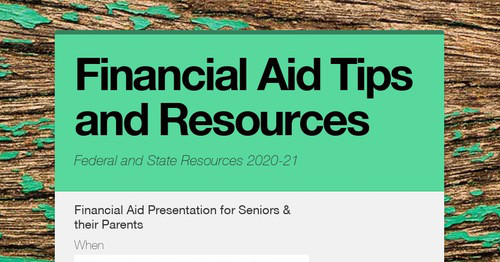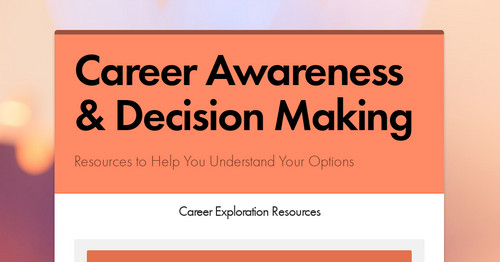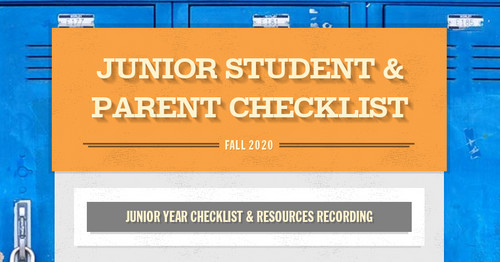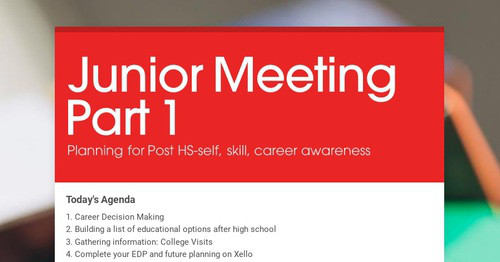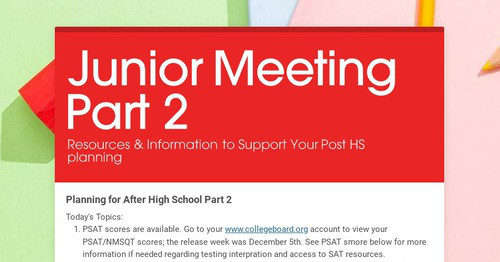
Planning Your Future
Information and Resources for students and parents
Topics covered
2. College Selection: finding a good fit and building a good list
3. College Visits: why, when, how and what
4. Admission Basics: policies, deadlines and types of applications, the process, college application preparation
5. Junior Year Testing: SAT, ACT, MME, PSAT results
6. Senior Schedule
7. Scholarships: Merit Scholarships, community/organizational scholarships
8. NCAA Eligibility: Student-athletes interested in D1 and D2 college athletics
9. Community College & Transferring Credit
10. AP Exam Scores & College Credit Equivalencies
11. Special Interests
1. Career Decision Making
Future career planning and educationally planning takes time and intention. Ideally, students need to make time to explore, research and reflect on potential future careers and planning for their future in order to make informed decisions around their educational planning and post high school plans. It is also recommended that families are apart of this exploration and investigation process. Our hope for students is that they will be able to identify careers that will match their passions, interests, skills and personality and work from that angle. It will be an amazing attainment for students when they are working in a career that brings them satisfaction, a sense of purpose and meets their life goals.
For some it may seem early to know what career you’d like to pursue. But developing career awareness now so when the time comes, you’ll feel more confident in knowing who you are so you can make a decision. Additionally, this comes in handy when you are looking at and considering what types of college, college majors or educational training you need to plan for.
Career Readiness
2. COLLEGE SELECTION and FINDING A GOOD FIT EDUCATIONAL PLAN
Consider Your Preferences
What do you value and prefer when looking at colleges and educational programs?
Need help filtering colleges and educational opportunities?
Try using Xello, College Board Big Future or Going Pro
- Xello Use your rcs gmail account login information
Questions and Ideas you should consider before choosing a college!
How will this college prepare me for my life after college?
Does the school serve my academic and personal interests?
- College Express-30 Questions to Ask Before Choosing a College
- College Board Big Future Know Yourself Assessment
Resources on Finding a Good Fit College and Educational Path
Online Resources
Xello: (use your rcs gmail login info)
http://nces.ed.gov/collegenavigator
https://www.nacacfairs.org/learn/decide/determining-the-right-fit-college/
https://bigfuture.collegeboard.org/find-colleges/how-find-your-college-fit
https://bigfuture.collegeboard.org/college-search
https://www.petersons.com/college-search/colleges-universities-choosing-fit.aspx
http://www.princetonreview.com/college-advice/find-your-best-fit-college
https://www.princetonreview.com/college-search
Books:
College is Yours in 600 words or less by Patick O'Connor (http://www.collegeisyours.com)
Colleges That Change Lives by Loren Pope (http://www.ctcl.org/)
Rugg's Recommendation on College by Fredrick Rugg
Fiske Guide to Colleges by Edward Fiske
Other resources
- College Admission Representative Visits at SCHS (every fall)
- College Nights (RCS hosts one each in district)
- College Websites
- Join a college(s) mailing list
- College visits
Building The List/Making a Plan
- There is no exact amount of college applications you should send, however we recommend you consider a range of 3-6.
- Apply to "Good Match" colleges: You have a good chance of getting in; your data matches their incoming freshmen data profile.
- Apply to "Safety" colleges: Your data is above their average incoming freshmen.
- Apply to "Reach" colleges: The college's profile data is above your profile or this college is a highly selective school. A highly-selective college is defined as the acceptance of 15% or less of everyone who applies. The number of these colleges have gone up, and their admit rates have gone down, so some have rates as low as 5%. An Outstanding Academic Record Is No Guarantee of Admission.
The more reach schools you apply to, the larger your total list should be.
Example list: 1-2 reach, 2-3 match, 1 safety
An easy way to find a college's incoming freshmen profile is through Xello or the college's website.
*Note: Admissions data is typically listed as UNWEIGHTED GPA. Students should unweight their GPA to have a realistic comparison to the college incoming freshmen profile.
Criteria Colleges Look for In Potential Students
Important! Organizing and documenting your research and discoveries!
3. College Visits
College visits are both an important and exciting part of the college selection process. If you’re going to spend four years somewhere, you better like what you see and feel when you’re on campus. Many colleges have a variety of opportunities for potential students to participate and access information. Check out all the opportunities on your interested college website to take full advantage of their potential student programming.
Why Visit?
- Does it feel like it could be your home?
- Is campus up-to-date, clean?
- Will you have enough to do outside of class?
- What’s the town like around it?
- Is it the right mix of support and challenge?
- Living conditions, food, facilities, etc.
- Does it ‘feel’ like a good fit.
- Will it meet your academic goals and needs?
- Will it meet or support post college goals?
When and How to Visit
- Make a college visit whenever you can, but it is best to visit when classes are in session prior to applying.
- It is highly recommended that you make an 'official' visit with the college admission office so you have access to direct information and resources.
- If you didn't have a chance to make a visit prior to completing the college application than you will want to make a visit prior to making a decision during senior year.
- Try to avoid only visiting on a weekend-every campus is great on a Saturday.
How Can I Make Arrangements for a Visit
- Most colleges will have an online sign up for a tour or visit. Check their website under future/prospective student or admissions.
- Call admissions office if you have further questions about the visit and want to inquire about specific priorities for your visit.
Considerations Prior and During Visit
- Read information about the college prior to visit. This way you won't be overwhelmed on the tour and can listen for the 'insider scoop'.
- Ask if they will allow you sit in a class. Look up the schedule of classes and pick a few classes you would be interested in visiting.
- Visit the department or "college of your major"
- Talk to students
- Eat the food
- Bring your list of questions. Take time to reflect in advance what is most important to you in a college.
- Take pictures and notes
- Find out what other out reach opportunities they offer: summer camps, career days, etc.
College Visit Checklist & Questions
http://www.cappex.com/media/collegeVisitChecklist.pdf
http://blog.prepscholar.com/good-questions-to-ask-on-a-college-tour
College Visit Tips
https://bigfuture.collegeboard.org/find-colleges/campus-visit-guide
Virtual Tour
Questions to ask a college student during your college visit?
1. How easy is it to get help in class or get in touch with your professors?
2. Have you been able to get into the classes you’ve wanted?
3. What’s life outside of the classroom like?
4. Do most students stay here on weekends, or do they go home?
5. How is the food?
6. How much time do you spend studying?
7. How responsive is the administration when is comes to addressing students’ problems?
8. Do you feel safe on campus?
9. What do you wish you’d known before coming here?
10. If you had to make the decision again, would attend this college?
4. Admissions Overview
Types of Admissions Policies
Types of Applications
Common Application is used by hundreds of member colleges.
◦Over 1000 colleges participate nationwide
◦There are currently 32 Michigan Colleges and Universities on the Common Application.
◦ Benefit is to applying to multiple colleges at the same time
◦Some member colleges will require the students apply through the Common Application and others will have an alternative option that may be better suited to the student's needs. When unsure what application to select you can always check with your counselor.
Dates and Deadlines
Application Timelines:
We encourage students to have most of their applications completed and submitted by the end of October of their senior year, especially students who are applying Early Action or to a rolling admission school.
Decision Timelines:
You must tell every college of your acceptance or rejection of offers of admission or financial aid by May 1. Send a deposit to the college you choose.
The 4 STEP COLLEGE APPLICATION PROCESS
1. Student completes application online and submits the application.
2. Student create an account at www.parchment.com and request a transcript be sent to the colleges they apply. The transcript will include the student’s senior schedule.
3. Students should send SAT and/or ACT scores to the colleges directly from the testing agency if they haven’t done so already when they registered for the test. This can take several weeks so you will want to do this ahead of time to avoid any application delays or missed deadlines.
4. Track and double check your applications, transcript and test scores are received at the institution. In some cases the student's college application account will serve as a portal of communication.
College Application To Do list for Spring and Summer Prior to Senior Year
- This is a good time to ask politely for letters of recommendation if your college requires them. This provides lead time for the writer. Provide your letter writer with a student profile sheet.
- Continue to attend college visits/tours/open houses (virtual or in person)
- You could take the SAT or ACT if you want or need too.
- Continue to work hard and seek help to get the best grades you can as you finish out junior year.
- Review social media profiles and posts if necessary. Create a new email account for college apps and scholarships.
- Work on college essays over the summer(some essay tips below). This will eliminate a lot of added stress during the school year. Common Application will have their essay posted in May and most college will have their essays posted by August.
What Happens After You Apply?
What do Colleges do once they have the student’s application? Either they….
1. Accept: College will send you information on housing, orientation, financial aid etc.
2. Defer: means you will remain in the applicant pool for consideration but the college will ask the student to provide more information. Examples could be semester 1 grades, updated test scores, etc.
3. Wait list: Unfortunately you just have to wait. The college is still considering your application, but must hear from the admitted students first before they may offer you admissions. Ask if scholarship and financial funds will be available if you're accepted.
4. Deny: Unfortunately the college cannot offer you admissions. However, you could check on J-term admissions(winter term) or a summer start.
5. College Admission Tests
Quick Facts
- 4 parts: Reading, Writing and Language, Math, and the optional SAT Essay
- 400–1600 score scale
- 3 hours and 50 minutes with the SAT Essay — or 3 hours without it
- 4 answer choices
- 4 college application fee waivers for every student who uses an SAT fee waiver
SAT Dates
https://collegereadiness.collegeboard.org/sat/register/dates-deadlines
SAT Testing Months
- December
- March
- May
- June
- August
- October
SAT Subject Tests: some colleges will require or recommend students take a SAT subject test in addition to the SAT. They are one hour tests. Please use college websites for update to date application requirements or recommendations. If a college strongly recommends a SAT subject test than we would recommend a student follow the recommendation of the college.
Registering for SAT
To register for a National Saturday SAT test students can sign into their College Board account and register for the SAT.
Know What to Expect on the SAT
Find out what kinds of questions you’ll see on the new SAT and what the test will measure. Where do you want to start?
Sending Your SAT Scores and Score Choice
Sending your Score to College and Scholarships
- Before SAT test day: You can send four free score reports to colleges every time you register for the SAT. This is the fastest way to send scores to colleges and scholarship programs—and there’s no fee. Many colleges view receiving your scores early as a demonstration of your interest.
- After test day: You can still send four free score reports to colleges up to nine days after the test—after that there's a fee for sending score reports, unless you’re eligible for an SAT fee waiver.
SAT Score Choice
With SAT Score Choice™, you can choose which scores you send to colleges. Choose by test date for the SAT and by individual test for SAT Subject Tests—but keep in mind that some colleges and scholarship programs require you to send all your scores.
- Should I send my SAT to the colleges? Collegeboard says: Since most colleges consider a student’s best score, you can send all your scores. If you’re unsure which scores to send or if your college has not shared their policy, we recommend you send all scores.
- How do I find out if I need to send a college all of my scores? Collegeboard says: When you send scores through your College Board account, you'll see score send policies for any college or scholarship program you choose. You should check college websites to make sure you have the latest information. You're responsible for knowing current score send policies.
- When can I use score choice? Collegeboard says: You can use Score Choice for any score reports you send online or by phone, but you can only choose between tests that are already scored.
- Do I pay extra to use score choice? Collegeboard says: There are no extra fees for choosing which scores to send to a single college. Any or all of your scores can be sent to a college in a single report.
- What if I decide not to use score choice: Collegeboard says: If you decide not to use Score Choice, all your scores will be sent to the colleges you choose. Score Choice applies only to the score reports you send to colleges. You and your high school will still receive scores from all of your test dates.
Official FREE SAT Test Prep
The SAT or ACT?
As a school we give the SAT as part of state testing. ACT is available if students would like to try a different standardized test. Colleges will look at either score. You can register for ACT at http://www.actstudent.org.
Description of the ACT
The ACT consists of four multiple-choice tests: English, mathematics, reading, and science. The ACT with writing includes the four multiple-choice tests and a writing test.
Test Content
English: 75 questions, 45 minutes: Measures standard written English and rhetorical skills.
Mathematics; 60 questions, 60 minutes: Measures mathematical skills students have typically acquired in courses taken up to the beginning of grade 12.
Reading; 40 questions, 35 minutes: Measures reading comprehension.
Science; 40 questions, 35 minutes: Measures the interpretation, analysis, evaluation, reasoning, and problem-solving skills required in the natural sciences.
Optional Writing Test; 1 prompt 40 minutes: Measures writing skills emphasized in high school English classes and in entry-level college composition course.
ACT Testing Months
September
October
December
February
April
June
July
Should I retake a college admissions test?
1. Do you think you can do better?
2. Do you need to do better (cut off score for scholarships?)
3. How much time are you willing to give to study?
Interesting Facts...
◦ Data #1: For 55% of you, your score will improve when you retest
◦ Data #2: Scores don’t typically go up after twice unless you study, practice, take a prep class . . . do something
SAT ACT Concordance Table
MME STATE TESTING 2023
April 12: SAT plus essay http://www.collegeboard.org
April 13: ACT WorkKey https://www.act.org/workkeys/
◦Tests personal workplace skills tests: applied math, reading for info and location info
◦National Career Readiness Certificate
TBA: MSTEP (MI Science and Social Studies)
PSAT Results will be available online December 7th. See link below for details.
Test Prep Resources
TEST PREP resources
Companies
Khan Academy https://www.khanacademy.org/sat (OFFICIAL SAT TEST PREP)
ACT Test Prep: http://www.act.org/content/act/en/products-and-services/the-act/test-preparation.html
Princeton Review: 1-800-273-8439 www.princetonreview.com
Kaplan: 1-800-KAP-TEST (1-800-527-8378) www.kaptest.com
Study Point: 1-87STUDYPOINT or (1-877-883-9764) www.studypoint.com
College Quest Educational Services: 248-647-8378 www.collegequestmi.com
Kabir Prep: https://www.kabirsprep.com/ (website was done at time of this update)
Zara Tutoring: https://www.zaratutoring.com/
Hunington Learning: https://huntingtonhelps.com/test-prep
NOTE: THIS LIST IS COMPILED AS A COURTESY SERVICE TO PARENTS AND STUDENTS. IT IS NOT TO BE TAKEN AS A RECOMMENDATION. TUTORS LISTED ARE NOT EMPLOYED AS TUTORS BY ROCHESTER COMMUNITY SCHOOLS AND ARE NOT SUBJECT TO BACKGROUND CHECKS. IF YOU INTEND TO USE THIS LIST TO LOCATE A TUTOR OR ORGANIZATION, IT IS YOUR RESPONSIBILITY TO INTERVIEW CANDIDATES AND MAKE A SELECTION BASED ON INFORMATION YOU FEEL IS RELEVANT TO YOUR PARTICULAR NEEDS.
Free Websites
- www.4tests.com/
- www.number2.com/
- www.actstudent.org/sampletest/
- www.petersons.com/college-search/free-act-practice-test.aspx
- www.test-guide.com/free-act-practice-tests.html
- www.princetonreview.com/freepracticetest
- https://www.kaptest.com/college-prep/getting-into-college/free-practice-test
- http://www.freetestprep.com/
6. Senior Schedule
Scheduling will take place in the winter. If you haven’t already put some thought into what your senior year will look like, now is a good time. Remember college prep schedule should have least 4 hours of academics; selective colleges prefer 5 hours of academics. Don’t forget to include any graduation requirements. You must take English and math both semesters, and any other PE and/or VPAA’s needed to complete requirements.
7.Scholarships
Merit Scholarships Examples
- Many but not all colleges have merit based scholarships to award students. The merit scholarships do vary at each college, however many times criteria will include GPA & test scores.
- Examples from a few colleges:
https://www.oakland.edu/financialservices/available-financial-assistance/undergrad/
http://www.udmercy.edu/apply/financial-aid/scholarships/freshmen/index.htm
http://www.svsu.edu/cfsc/typesoffinancialaid/scholarships/academicscholarships/
https://www.gvsu.edu/financialaid/incoming-freshman-and-transfer-merit-scholarships-160.htm
http://adrian.edu/admissions/financial-aid/tuition-scholarships/
Scholarship Search Tips and Engines
1.Check the scholarship/financial aid webpage of the colleges you are interested in.
2.Use a FREE scholarship search engine such as:
http://www.college-scholarships.com/free-scholarship-searches/
3.Review scholarship posting on SCHS Counseling Website
4.Complete the FREE Application for Federal Student Aid starting October of 2021. FAFSA will be available sooner this year. Parents and students will have access to complete the application in the fall instead of waiting until January. FAFSA will be using PRIOR-PRIOR year tax information. More information to follow in the fall. Financial Aid Newsletter and Resources.
Students interested in Division I or II college athletics need to make sure they meet eligibility requirements
Core Courses (see list of approved course on the eligibility center website)
●NCAA Division I requires 16 core courses plus GPA/Sliding Scale
●NCAA Division II requires 16 core courses. (2013 and after)
• Other Eligibility criteria
●Test scores and GPA (2.3 or higher)
● Division 1: sliding scale & Division 2: ACT sum score
•Register during Junior year for NCAA at: www.eligibilitycenter.org
•Send your ACT scores to NCAA (code: 9999)
•Check out College Bound Student-Athlete and Parent Guide at:
http://www.ncaapublications.com/productdownloads/CBSA19.pdf
•NCAA Academic Requirements:
https://www.ncaa.org/sites/default/files/2018DIEC_Requirements_Fact_Sheet_20180117.pdf
9. Community College & Transfer Credit
- Receive 2 year degree (associates)
- Transfer to 4 year college after 1 or 2 years
- See transfer equivalency charts at each school of interest
- Talk to a college advisor if you know where you want to transfer
- You will know exactly what will transfer and how much credit https://www.oaklandcc.edu/transfer/
- Save money on the core/required courses
- Can get transfer scholarships
- Save money
- Couldn’t get in class during fall/winter semesters
- Want to get through faster
- Want a lighter load during the regular year
10. AP Credit
Each college will have their own AP credit equivalency guidelines. It could be useful to look at your potential colleges AP Credit Guides Policies just for awareness.
Examples:
https://oakland.edu/registrar/collegecredit/
https://admissions.umich.edu/apply/freshmen-applicants/ap-ib-credit
https://wmich.edu/registrar/students/advising/students-advising-ap
11. Special Interest Colleges & Programs
- Co-ops Colleges: http://www.collegeaffordabilityguide.org/co-op-programs/
- Art Colleges: http://www.incredibleart.org/artroom/colleges/colleges.html
- Military Academy: A military academy or service academy is an educational institution which prepares candidates for service in the officer corps of the army, the navy, marine corps, air force or coast guard.
- Disability Services: http://www2.ed.gov/about/offices/list/ocr/transition.html and check the individual colleges disability services webpage.
- https://www.bestcolleges.com/resources/students-with-disabilities/
- https://www.bestcolleges.com/financial-aid/students-with-disabilities/
- https://www.bestcolleges.com/resources/career-guide-for-students-with-disabilities/
- Apprenticeship Guide for Oakland County https://www.oakgov.com/advantageoakland/resources/Documents/wd_apprenticebook.pdf
- Going Pro in Michigan: https://www.going-pro.com/















